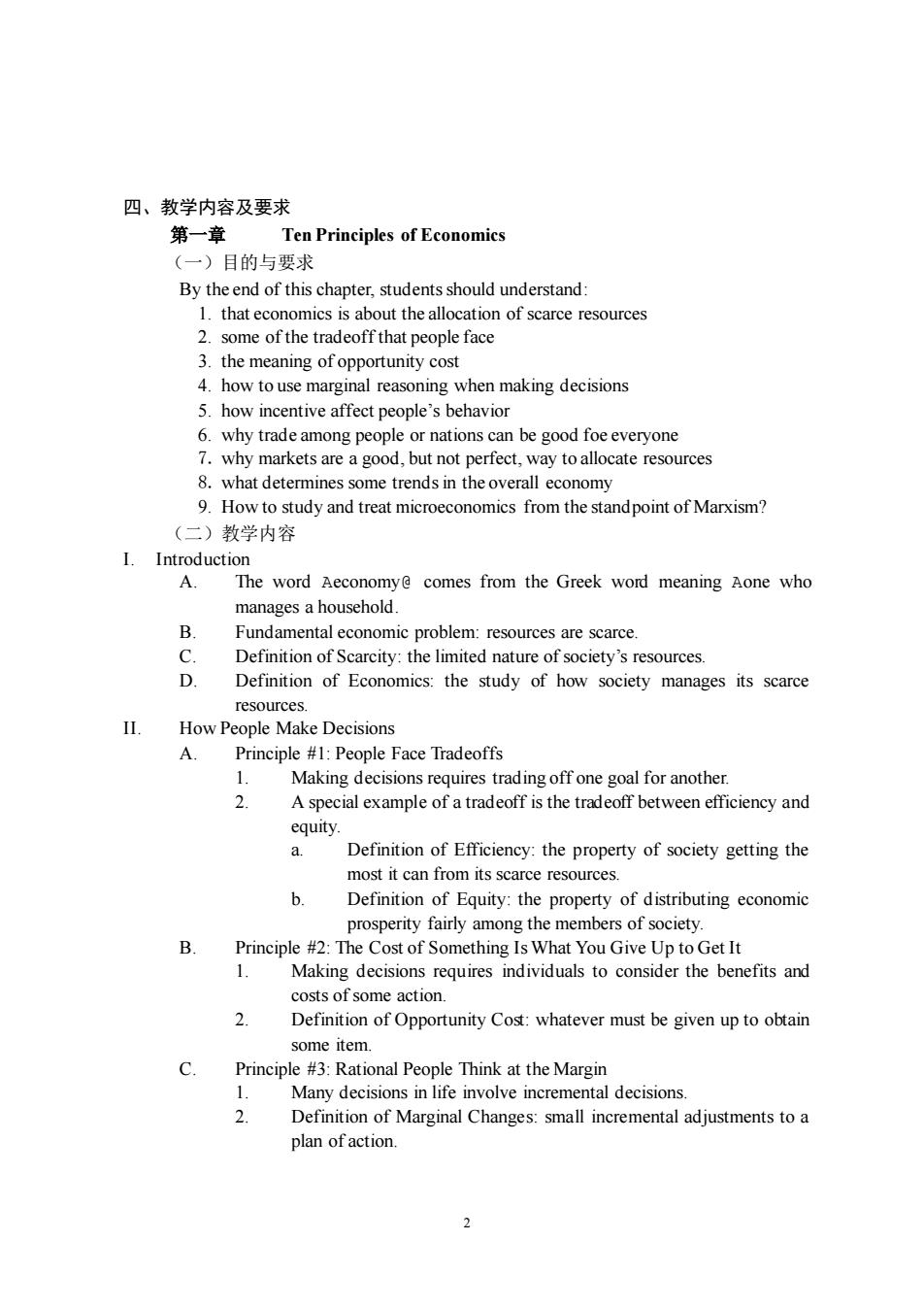正在加载图片...

四、教学内容及要求 第一章 Ten Prineiples of Economics (一)目的与要求 By theend of this chapter,students should understand: 1.that economics is about the allocation of scarce resources me of the tradeoff that people face 3.the meaning of opportunity cost 4.how to use marginal reasoning when making decisions 5.how incentive affect people's behavior 6.why trade among people or nations can be good foe evervone 7.why markets are a good,but not perfect,way toallocate resources hat determine ome trends in the overall economy 9.How to study and treat microeconomics from the standpoint of Marxism? (二)教学内容 I.Introduction The word Aecor nye comes from the Greek word meaning Aone who manages a household B Fundamental economic problem:resources are scarce. Definition of Scarcity:the limited nature of society's resources. D Definition of Economics:the study of how society manages its scarce IL. resource How People Make Decisions A. Principle #1:People Face Tradeoffs 1 Making decisions reguires trading off one goal for another. A special example of a tradeoff is the tradeoff between efficiency and equity Definition of Efficiency:the property of society getting the most it can from its scarce resources. b Definition of Equity:the property of distributing economic prosperity fairly among the members of society. Principle #2:The Cos You Give Up to et Making decisions requires individuals to consi ider the benefits and costs of some action. Definition of Opportunity Cost:whatever must be given up to obtain some item Principle #3:Rational People Think at the Ma Many decisi life involve increm decisions 2 Definition of Marginal Changes:small incremental adjustments to a plan ofaction. 22 四、教学内容及要求 第一章 Ten Principles of Economics (一)目的与要求 By the end of this chapter, students should understand: 1. that economics is about the allocation of scarce resources 2. some of the tradeoff that people face 3. the meaning of opportunity cost 4. how to use marginal reasoning when making decisions 5. how incentive affect people’s behavior 6. why trade among people or nations can be good foe everyone 7. why markets are a good, but not perfect, way to allocate resources 8. what determines some trends in the overall economy 9. How to study and treat microeconomics from the standpoint of Marxism? (二)教学内容 I. Introduction A. The word Aeconomy@ comes from the Greek word meaning Aone who manages a household. B. Fundamental economic problem: resources are scarce. C. Definition of Scarcity: the limited nature of society’s resources. D. Definition of Economics: the study of how society manages its scarce resources. II. How People Make Decisions A. Principle #1: People Face Tradeoffs 1. Making decisions requires trading off one goal for another. 2. A special example of a tradeoff is the tradeoff between efficiency and equity. a. Definition of Efficiency: the property of society getting the most it can from its scarce resources. b. Definition of Equity: the property of distributing economic prosperity fairly among the members of society. B. Principle #2: The Cost of Something Is What You Give Up to Get It 1. Making decisions requires individuals to consider the benefits and costs of some action. 2. Definition of Opportunity Cost: whatever must be given up to obtain some item. C. Principle #3: Rational People Think at the Margin 1. Many decisions in life involve incremental decisions. 2. Definition of Marginal Changes: small incremental adjustments to a plan of action